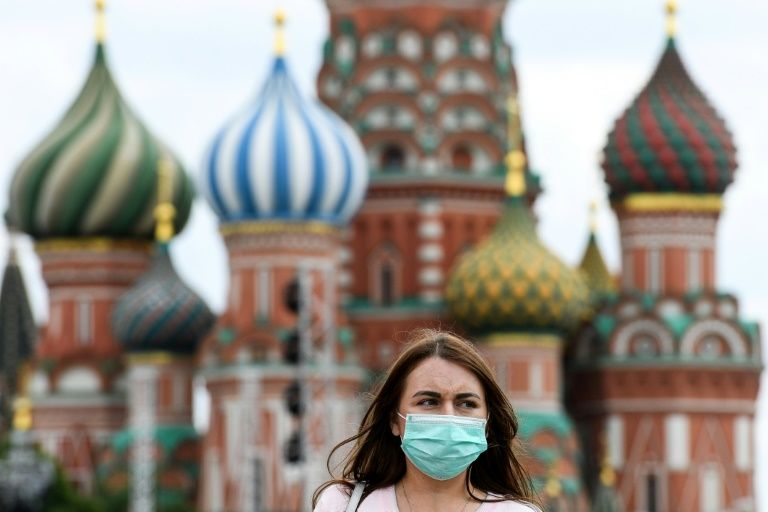Moscow lockdown to end as Russia eases anti-virus measures
 Moscow's lockdown will lift despite capital being Russia's hardest hit city in the pandemic (AFP Photo/Kirill KUDRYAVTSEV)
Moscow's lockdown will lift despite capital being Russia's hardest hit city in the pandemic (AFP Photo/Kirill KUDRYAVTSEV)Russia announced Monday it was lifting a range of anti-coronavirus measures including a strict lockdown on Moscow, despite still recording thousands of new infections every day.
Moscow Mayor Sergei Sobyanin said the capital’s general lockdown and pass system would end on Tuesday, allowing residents to travel freely for the first time since late March.
“Moscow is returning to the usual rhythm of life,” he said in a video message on Facebook, adding that the elderly and those with chronic diseases will be allowed to leave their homes.
Russia has been moving quickly to ease restrictions even as it registers nearly 9,000 new coronavirus cases and more than 100 deaths on a daily basis.
The country had recorded a total of 476,658 coronavirus infections as of Monday — the third-highest number in the world — and 5,971 deaths.
Officials say the high number is the result of a huge testing campaign, with more than 13 million tests carried out so far, and point to Russia’s relatively low mortality rate as evidence it is safe to ease lockdowns.
Critics have accused authorities of under-reporting deaths and say officials are rushing to lift restrictions for political reasons.
President Vladimir Putin has rescheduled a high-profile World War II military parade in Red Square for June 24 and a vote on constitutional reforms for a week later, on July 1.
The vote, which will clear the way for changes allowing Putin to potentially stay in power beyond his current Kremlin term, was the centrepiece of the longtime leader’s political calendar for this year but had to be postponed from April 22 as coronavirus cases surged.
Fierce Kremlin critic and opposition leader Alexei Navalny quipped on Twitter that if lockdown regulations were being eased then Muscovites should be allowed to “rally against the restting of Putin’s term limits”.
– Danger ‘still exists’ –
Moscow, Russia’s largest city with more than 12 million people, had been under lockdown since March 30.
Some measures have been gradually lifted over the last few weeks, with non-food retail shops permitted to reopen and residents allowed to go for walks according to a fixed schedule.
Sobyanin said that as well as all restrictions on movement being lifted from Tuesday, hairdressers, beauty salons and vets will be allowed to reopen.
Beginning next week, libraries, real estate offices and companies that provide services to residents will be able to resume their work, he said.
Restaurants and cafes would open in two stages beginning June 16 with Moscow residents allowed to visit terraces, with further restrictions easing the following week.
But wearing masks and gloves remains mandatory in the capital and Sobyanin urged caution, saying that the “likelihood of coronavirus infection has decreased, but still exists.”
“We must constantly monitor the situation and prevent a new outbreak.”
– International travel –
Russia also on Monday announced citizens could now travel abroad, with Prime Minister Mikhail Mishustin saying a government order was signed allowing them to leave the country to work, study or take care of sick relatives.
Foreigners can also visit Russia to care for relatives, according to the decree signed June 6.
All international flights were grounded in late March, although there have since been a few flights ferrying stranded Russians in and foreigners out.
Mishustin said the move was justified because the infection rate has stabilised over the last six days, particularly in Moscow.
Moscow is Russia’s most-affected city with almost 200,000 confirmed cases and 2,970 deaths.
Other parts of Russia have seen emerging clusters of cases, including the Far Eastern Kamchatka peninsula, where 24 staff were infected at a children’s home, Interfax news agency reported Monday.
The region, known for its active volcanoes and spectacular nature, has confirmed 1,168 cases out of a population of just over 300,000.
The number hospitalised in the region at 423 is already higher than the 406 beds prepared for virus patients, according to the regional health ministry’s website.
SOURCE: REUTERS










